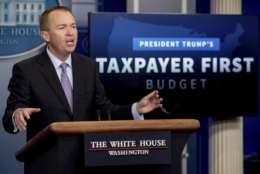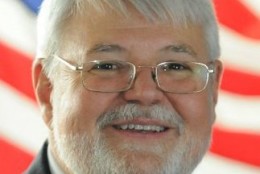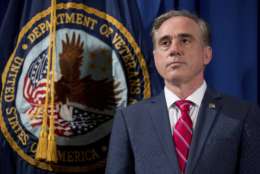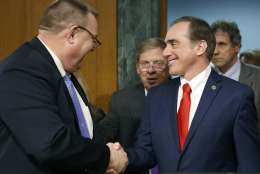American Federation of Government Employees
-
The President's full 2018 budget proposal offers a 1.9 percent pay raise for civilian employees and a 2.1 percent raise to members of the military. But federal employee unions and organizations say the raise does little to undo the damage the President's proposed cuts to federal retirement benefits will have on current employees and retirees and future government workers. The budget also details workforce reductions at some agencies.
May 23, 2017 -
It's been an interesting year for federal employee union, first a hiring freeze. and then a renewed attempt in the Senate to change the terms of employment at the Veterans Affairs Department. Now the House has turned its attention to civil service reform. J. David Cox, national president of the American Federation of Government Employees, joins Federal Drive with Tom Temin for one union's view.
May 23, 2017 -
House Oversight and Government Reform Subcommittee Chairman Mark Meadows (R-N.C.) says civil service reform is coming. The committee heard proposals for possible changes to federal employees' pay and benefits Thursday.
May 18, 2017 -
Both the Veterans Affairs and Justice departments believe they can easily resolve some concerns with the constitutionality of the VA Accountability and Whistleblower Protection. DoJ is concerned, however, that VA will run into the same issues that ultimately rendered a controversial provision on firing senior executives unconstitutional.
May 18, 2017 -
The Veterans Affairs Accountability and Whistleblower Protection Act, which senators introduced last week, may have more momentum than previous bills. It now has 12 co-sponsors, including four Democrats and VA Secretary David Shulkin himself. Yet some federal employee groups and experts question whether the new bill has the teeth to truly tackle long entrenched cultural problems at the department.
May 16, 2017 -
Members of the Senate have reached a long awaited agreement on new accountability procedures for senior executives and employees within the Veterans Affairs Department. A bipartisan group of senators introduced the Veterans Affairs Accountability and Whistleblower Protection Act Thursday morning. It would change current disciplinary appeals rights for both SES and rank-and-file employees.
May 11, 2017 -
Averages: If you encase one bare foot in dry ice and the other in boiling oil, on average you're doing fine.
April 27, 2017 -
Federal employees with a high school diploma or less earn 53 percent more in total compensation than their counterparts in the private sector, while federal workers with a bachelor's degree earn 21 percent more, according to a new report from the Congressional Budget Office. In contrast, federal employees with a professional degree or doctorate earn 18 percent less than their counterparts in the private sector.
April 26, 2017 -
Congress has been criticized for kicking the can down the road when it comes to federal spending, but as the government shutdown clocks ticks closer to midnight — and agencies dust off their contingency plans — some are wondering if that kicked can might be the best option right now.
April 21, 2017 -
Linda Springer, a senior adviser at the Office of Management and Budget, said in part 2 of her exclusive interview about the Trump administration’s reorganization plans that the White House wants to give agencies a lot of freedom in how they execute their plans.
April 21, 2017 -
Senior Correspondent Mike Causey says now that EPA is handing out buyouts, it's likely other agencies will follow suit.
April 21, 2017 -
The Office of Personnel Management recently released a long-awaited report on official time for fiscal 2014. It found agencies used slightly more official time that year than fiscal 2012, the last time OPM completed a governmentwide report on the topic. The report's release comes as Congress looks to limit federal employees' official time use.
March 27, 2017 -
DoD analysts and former officials are recommending direct hiring and pay authority over civilian Pentagon workers.
March 24, 2017 -
A new bill that would limit how much time doctors, nurses and other employees at the Veterans Affairs Department could spend on union business has support now from VA itself. The department said having its employees spend 100 percent of their hours on official time is "necessary, reasonable and in the public's best interest."
March 22, 2017 -
The Environmental Protection Agency faces a 31 percent cut to its budget, a number that agency advocates say will harm the workforce and public health.
March 16, 2017















